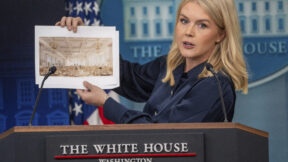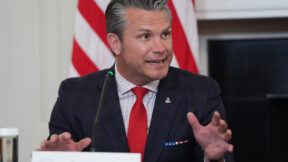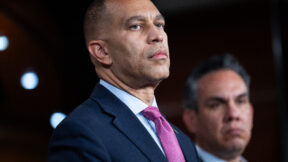Trump Poll Numbers Up, DeSantis Plummets as Former President Pummels Florida Governor

AP Photo/Manuel Balce Ceneta, File
Former President Donald Trump has been lobbing rhetorical bombs and unfounded smears at Florida Governor Ron DeSantis, widely viewed as his chief rival for the 2024 GOP presidential nomination. Those strikes seem to be having an effect, with Trump seeing a double digit gain in his polling numbers since December while DeSantis’ have fallen nearly that same amount.
A Monmouth University poll was taken nationally of 521 Republican and Republican-leaning voters from March 16 though 20, 2023, via telephone and online. The margin of error was +/- 6.6 percentage points.
“Trump has made gains among nearly every voting bloc since the start of the year and is especially popular among strong MAGA supporters,” said the polling memo, noting that the former president had improved his numbers to 41 percent to DeSantis’ 27 percent.
That’s a notable gain from the university’s February poll, which had him tied with DeSantis at 33 percent, and a reversal of their fortunes from December, which had the Florida governor in the lead with 39 percent to Trump’s 26 percent.
The New York Times’ Nate Cohn noted the trend in a tweet, calling it the “longest-long-term trend from a high-quality poll in the race.”
In a Times article published March 17, Cohn noted the trends falling Trump’s way while cautioning against trusting a single poll for electoral forecasting:
Over the last two months, we’ve gotten about a dozen polls from pollsters who had surveyed the Republican race over the previous two months. These polls aren’t necessarily of high quality or representative, so don’t focus on the average across these polls. It’s the trend that’s important, and the trend is unequivocal: Every single one of these polls has shown Mr. DeSantis faring worse than before, and Mr. Trump faring better.
Still, as data journalist Aron Goldman noted, both DeSantis and Trump enjoyed high name recognition and were virtually tied in a head-to-head matchup. DeSantis’ favorability ratings did beat Trump, but the former president came out strongly ahead among GOP voters without a college degree.
The consensus among many political reporters was one of caution, as it is still early in the election cycle — only Trump, former South Carolina Gov. Nikki Haley, and entrepreneur Vivek Ramaswamy have official entered the race, and the Monmouth poll was mostly conducted before the news broke about Trump potentially getting indicted in the near future. But “an early DeSantis flatline could open up the field in unexpected ways, and potentially coax other hopefuls who have ruled themselves out back off the sidelines,” tweeted Inside Elections reporter Jacob Rubashkin.
DeSantis has also begun fighting back against Trump’s barrage of insults, with several targeted comments about the Stormy Daniels kerfuffle and other legal woes, along with efforts to portray himself as a “winner.”
Still, Trump’s base shows little signs of losing their fervor for the former president, as the Monmouth pollsters note his unwavering support among those Republican voters who identify as MAGA supporters:
Some of Trump’s broadest support comes from Republicans who identify as strong supporters of MAGA – the Make America Great Again movement within the party. These voters – who represent nearly 4 in 10 Republicans nationally – overwhelming prefer Trump (73%) to DeSantis (25%) in a head-to-head contest. DeSantis is preferred by those who only support MAGA somewhat (61% to 32% for Trump), as well as Republicans who do not consider themselves to be MAGA supporters at all (57% to 31%). Overall, 73% of GOP voters say the MAGA movement has been good for the party. Just 20% say it has been bad. Even among Republicans who are not MAGA supporters themselves, 34% say the movement has been good for the party.
“The movement Trump created is sticking by their standard-bearer. That’s enough for Trump to overcome weaker support among the less MAGA portion of the Republican electorate, at least for now,” said Patrick Murray, director of the independent Monmouth University Polling Institute.




